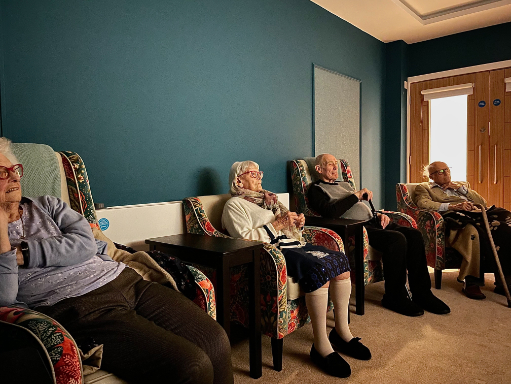What is the Difference Between Nursing and Residential Care?

One of the most commonly asked questions when choosing a care home is whether residential care or nursing care is the right option. While both provide essential care and support, they cater to different needs. Understanding the main difference between the two can help families decide what’s best for their loved ones.
The decision between the two depends on the individual’s health, mobility, and level of independence. Some people may begin in a residential care home and later transition to a nursing home as their needs change, while others require nursing care from the outset due to complex medical conditions or severe physical disabilities. In this blog, we will explore what each of the care types is and how to understand which is the right option for you or your loved ones.
What is Residential Care?
Residential care is designed for those who need support with daily tasks and personal care but do not require medical care. In a residential care home, care assistants help with personal hygiene, mobility, and meals, ensuring that residents feel safe and comfortable while maintaining as much independence as possible.
A key part of residential care is promoting well-being through social and physical activity. Many residential homes organise trips, encourage hobbies, and create a welcoming environment where residents engage with others. The focus is on improving quality of life while providing the necessary care and support for those who may struggle to live independently.
While residential care settings do not have registered nurses on hand 24 hours a day, they do work with visiting health professionals, such as GPs and physiotherapists, to meet any basic medical care needs. If a resident’s health changes over time and they require more specialised care, they may need to move to a nursing home or transition to another area of the home if they provide multiple care types.

What is Nursing Care?
Nursing care is intended for individuals with complex medical conditions or nursing needs that require professional oversight. A nursing home provides all the benefits of a residential care home but with the added support of qualified nurses on-site who can administer medication, monitor health conditions, and respond to emergencies.
Nursing homes provide care for those who need around-the-clock support due to conditions such as physical disabilities, a learning disability, dementia care, or long-term illnesses. Many residents in nursing homes require assistance with mobility, feeding, or specialist treatments that cannot be provided in residential settings. Registered nurses oversee all aspects of care, ensuring that residents receive the right medical interventions when they need them.
The Differences Between Residential and Nursing Care
There are many differences between residing in a care home and a nursing home, so we have outlined a few to provide a better understanding.
Level of Care Provided
The biggest main difference between residential care and nursing care is the level of assistance required. Residential care homes support residents with everyday living, helping residents with personal hygiene, meals, and mobility, but do not offer medical care. In contrast, nursing homes provide specialist nursing care for individuals with complex medical conditions, ensuring that a qualified nurse is available 24 hours a day to respond to health concerns.
Medical Supervision
In residential care settings, visiting health professionals such as GPs and district nurses may visit to provide check-ups, but there doesn't always have to be a nurse present. This means that any frequent medical treatment must be arranged externally. In a nursing home, qualified nurses on site are always available to provide treatments, monitor medical conditions, and intervene where it is needed.
Cost Differences
The cost of care is another important factor. Nursing home costs tend to be higher than those of residential homes due to the additional medical care provided. However, some residents may qualify for funded nursing care through the NHS if they have significant nursing needs. Others may receive financial support from their local council or local authority following a needs assessment. Understanding funding options can help families plan for long-term care, but it is important to check if a care home allows funded care before making a decision.
Activities Provided
Most care homes and nursing homes will provide a varied activities programme for residents to enjoy whenever they wish, but the type of activities will be different. In a nursing setting, activities will be adapted so residents with complex needs can still take part. This may include making the activity 1:1 instead of in a larger group or bringing it to their en-suite bedrooms. No matter your needs, you will still be able to continue doing what you love most.

Transitioning from Residential to Nursing Care
For many individuals, care needs evolve over time. Someone who initially moves into a residential care home for help with everyday living may later develop medical conditions that require more specialist attention. Progressive illnesses, such as Parkinson’s or dementia, can lead to a need for nursing care, while physical health changes may mean a person becomes less mobile and requires around-the-clock assistance from qualified nurses.
If a resident’s health changes significantly, the care home team will work with the individual and their family to explore options. In some cases, additional support can be arranged within the care home, such as more frequent visits from district nurses or other visiting health professionals. However, if the need for nursing care becomes too great, moving to a nursing home may be necessary to ensure proper medical care is provided 24 hours a day.
Some care homes provide multiple types of care in an all-inclusive environment, which makes it easy to transition between care types. A smooth transition from residential care to nursing care is essential to maintain their well-being and care teams will work closely with loved ones to ensure residents receive the right level of care and support at every stage of their care journey.



Find Compassionate Care in a Luxury Environment at Sandmere Care Home
At Sandmere Care Home in Margate, we understand how important it is to find the right type of care for yourself or a loved one. We provide the highest levels of Residential Care, Nursing Care, Dementia Care and Respite Care in a safe and supportive setting.
We have a team of friendly and highly trained professionals who ensure that each resident receives care and support tailored to their individual needs. We understand how important it is to find a care home that not only prioritises your current needs, but potential future developments. Our team are proud to provide a continuum of care to our residents meaning no matter what stage they are at in their care journey, they will always have a home with us.
It is important to us that residents continue doing the things they love most, so have a variety of in-house facilities and amenities available for use around the clock. Whether they want to have a stroll around the garden then a hot drink and snack in our cafe or enjoy a pamper in our hair & nail salon followed by a film in our cinema room, we have something for everybody.
If you would like to learn more about the exceptional care we provide or arrange a visit, please get in touch with us today. We can't wait to meet you.






